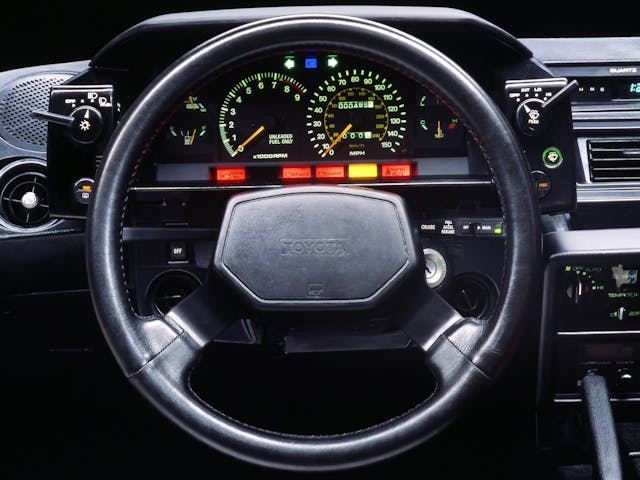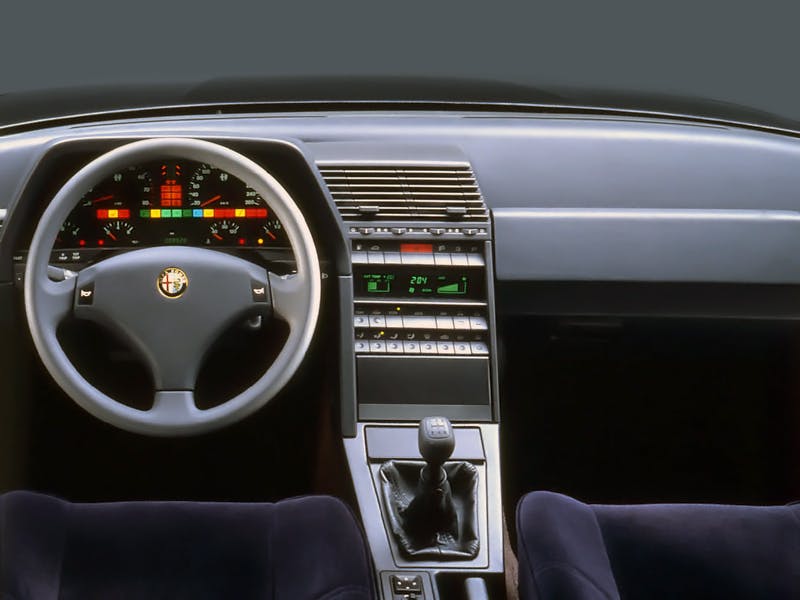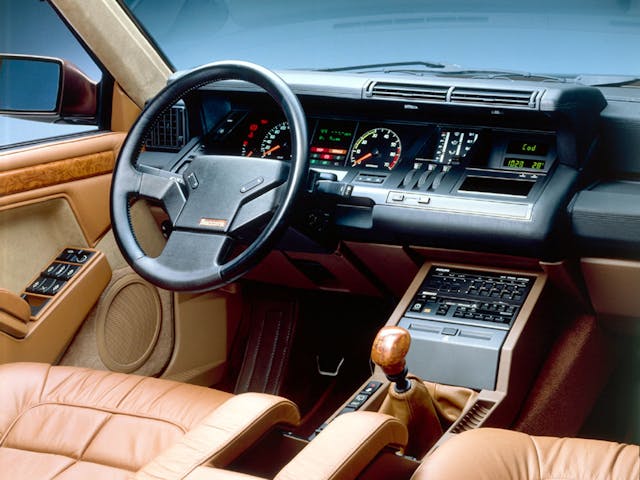Plastic Fantastic: The Joy of Buttons
Unless you’ve been living under a rock, you’ll have heard all about—or experienced—carmakers’ rush toward touch-screen technology.
There has been much wailing about it in the motoring press, and frustration via social media. However, to give manufacturers some credit, the modern car is so full of technology that condensing it all into easy-to-reach touch points is near impossible. In one modern car I borrowed this year, finding the button to alter the mirrors meant issuing a plea for guidance on social media.
Corralling all the functions onto one tablet makes sense—at least in principle—because you can pack more functionality into a small space. Well, in principle.
Just like those non-removable bottle caps that suddenly appeared this year, the concept behind them made sense, but the execution lagged behind—which is usually why I end up arriving for meetings wearing more of my in-car beverage than I’ve imbibed. Much in the same way, the touch screen technology in its current form doesn’t offer the instant response you might get from, say, twisting a knob or pressing some buttons.
Not only can you do this without having to take your eyes off the road to search through menus at 70 mph, but there’s a much more pleasant tactile feeling. Aston Martin has recently upgraded its interior to look and feel like high-end audio equipment.
However, there’s a joy to 1980s buttons that we love. This was an era of All The Technology, All At Once, which meant buttons and sliders for all sorts of functions sprouted up all over the dashboard and binnacles like a rampaging fungus. Add in hard black plastic and it all seems very Tonka Truck–style cool now—another way to feel at one with your car, other than driving, braking, steering, and swapping ratios.
We’ve pulled out some pretty amazing driving environments of the past—by no means comprehensive—but this list will certainly have you scouting out dashboard delight in the old cars around you.
Porsche 928

For many years, the 911’s interior was probably the least exciting part of the car. Indeed, it was often a criticism that for all the money you’d waxed on a 911 Turbo, the ambience wasn’t much more swish than a Carrera—or worse.
The 928 was different. Not only does it feel like you’re ensconced in a spaceship, all swoopy lines and multi-colored finishes, but the steering column moved. Other than the automatic shifter—which looked and felt like a Starship Enterprise thrust lever—our favorite part of the interior has to be the big twistable knobs to active lamps and windshield wipers. They’re comedically outsized for their function, but with a satisfying thunk to each movement. You could spend all day in there without turning the engine on, just interacting with it all.
Toyota MR2 Mk1

Japanese manufacturers really got on board with binnacle-mounted functionality. The MR2’s dashboard is fairly simple—we love the green-tinged wording, for example. However, the enormous rotary switches, with little levers attached, that sprout from the binnacle surround rather than conventionally behind the steering wheel itself, just feel magnificent to use. Add in buttons for the de-mister and the washer jets and it all feels far more immediate for any MR2 maestro to use. With the comically large gearshift handle and handbrake (relative to the rest of the car), the MR2 is memorable even before you fire it up.
Nissan 300ZX (Z32)

Choosing just one car to demonstrate the Japanese appetite for binnacle-mounted button overload is hard—the Subaru XT offers up an intriguingly unconventional offset three-spoke steering wheel with more buttons on top, for example. However, we’ve gone for the Z32 300ZX because, as Nissan’s top-of-the-range two-door, it was festooned with all sorts of technology to tempt people out of their Porsches.
Of course, condensing all this into the dashboard was an almighty challenge—it even had a mini-LCD screen!—and you could spend a day trying to work out where everything was. What makes it even more special is that it still has stalks for the lamps and washers and all the functions on top. By rights this could all be annoying on the move but just look how cool it is, and how satisfying it must be when you finally stop setting off the foglight by mistake during quick cornering.
Alfa Romeo 164

For all of Alfa Romeo’s exterior flair, not all interiors to wear the hallowed badge are quite as stylish. The 164, however, was button overload, with a bonus LCD display. It was very much like driving around with a high-end stereo in the front of the car. One for the nostalgic person who spent many an evening staring at their dad’s graphic equalizer.
Renault 25

Marcello Gandini had a knack for bringing the majestic to the mundane—even his least exotic projects have the odd flash of magic to them. Now, the Renault 25 was anything but mundane from behind the wheel, even if the exterior wasn’t quite as exciting as other Renaults of the era. This luxurious cruiser was great for eating up autoroutes—but we would struggle not to get distracted by this magnificent interior from Gandini himself. It looks like it’s come straight from the Alien ship Nostromo, but with a center console from Giorgio Moroder’s living room. Even the door handles look like a haptic delight, and the steering wheel even gets in on the button action. A masterpiece.
Lancia Trevi

The Trevi is an unconventional-looking car, even from the outside. The true delight is when you get inside. CAR magazine memorably described it as having a “Swiss cheese Beta” dashboard. It was designed by Mario Bellini, who had made his name designing homewares and typewriters. He found himself with a very small space to get a lot of information, and his reasoning for the design was that it was purely structural.
He was pilloried at the time—it was roundly criticized for being ugly. Now though? It hangs like a magnificent piece of outsider art, especially when you take in the two-spoke steering wheel. It’s certainly a daring design—and wouldn’t you rather stare at this for a long journey, rather than a touch screen?



The 1983-1985 Celica GTS/Supra interiors were cutting edge at the time and the press acknowledged it. You can’t beat Japanese electricals. Not sure that some of the GM stuff mentioned here was of the same calibre.
The 928 interior is true design at work. The current products look like the “designer” put his child in the car and exploded his box of crayolas. I will never buy a car with a distracting touch screen staring at me. Gauges, temp control and music are all that are required. For total peaceful enjoyment I take my 71 MGB for a tour. John
Revenge of the Nerds is now in high gear. The under 30 set is at home with computer stuff. Lot of us north of that humiliated with a steep learning curve. Times nostalgic for days of a metal key, and three pedals. Simple knobs, buttons and sliders. Actually speaking of a standard transmission, heard its a pretty good anti-theft device. Geek generation can’t work a clutch.
The most intelligent dashboard of any car I have owed is on the Rover TC2000.
A center mounted ignition key flanked by 2 switches on each side. The switches are a different shape and moved differently, complete control without taking your eyes off the road.
I decided to walk to the store yesterday. As I crossed the street in the crosswalk (walk signal lighted on a green) a woman in a brand new belly button 2024 Pod car almost ran into me. She appeared to be texting while also pushing buttons on her dashboard Lenovo. She was also attempting a right turn where the signage clearly states that a right turn there is not allowed on a red light. Said corner is only a block from my home and if I had a dollar for every screeching metal and plastic symphony we hear at that corner of no turn on red, I could save up that down payment for my own Maytag powered pod. The woman seemed offended when I slapped the hood (front curved cover area body panel covering likely a washing machine motor) with my open hand to get her to stop and save my lower legs the hassle of re-construction. Alas, give me the days again of “radio optional” and column shifted standard transmissions in front of the padded dash. We could then return to the land of people who can actually drive. Yes, I’m from a different era when dash knobs were chrome.
I remember when my father bought a 1986 Pontiac 6000 STE. The dash seemed so surreal. The speedometer worked as a bar graph! The cluster was “digital.” Lots of buttons and switches to adjust. My favourite was the fact that it had an air pump in the truck! Perfect for a 5 year old to have inflated basketballs etc!